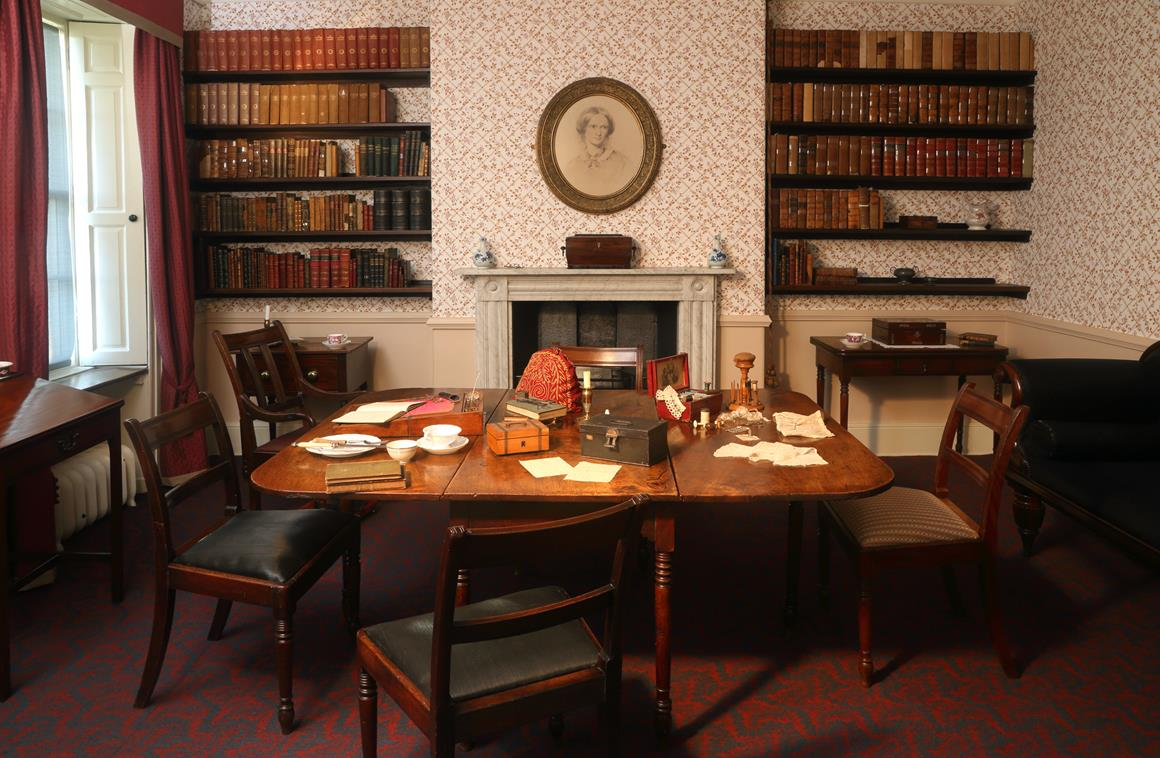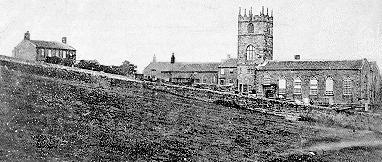
In the Brontes of Juliet Barker I read:
Branwell enjoyed some very repectable company.
He received encouragement and helpful critisism.
They formed a sort of informal society, meeting in different places.
I am going to search for some more information and photographs of these places.
George Hotel, Bradford, public house in Market Street, where Branwell met up with his artistic friends. The landlady, Miss Rennie (also spelt Renney and Reaney), “greatly prided herself on seeing at her house, in their hours of leisure, the artistic and literary celebrities of the neighbourhood” (Leyland, 1886) blackwellreference
The Anchor and Shuttle, Luddenden Foot. Stood near the canal.
A group of friends, including Branwell Brontë, met here and at other local pubs. In May 1886, it was replaced by the Victoria Hotel which was constructed on the same site.
The Lord Nelson in Luddenden luddenden-foot-and-branwell-bronte
The Lord Nelson dates back to the 17th. century and once housed a library. Branwell Bronte was a regular at the inn whilst he was station master at Luddenden Foot station. flickr/-oldeinnsofengland
flickr.com/groups/oldeinnsofengland/pool
Broad Tree Halifax
history.rootsweb.ancestry
Talbot and Old Cock Halifax
The White Horse Inn and the Old Talbot were former pubs in Woolshops, both have since been demolished. The Talbot was replaced with another building but was again demolished to make way for the Woolshops shopping complex in the early 1980s. calderdale
Woolshops: Yesterday history.rootsweb.ancestry
Please, look at this side for so many beautiful historic photographs.
Woolshops is a unique street name, dating back to the 15th century, when the wool traders of the Calder Valley came to this area to sell their locally-grown coarse wool on to areas making stout cloths, and local weavers came to buy the finer wool that they needed. Today the Shopping Centre successfully blends modern architecture with pre-19th century buildings and the only remaining example of Halifax’s earlier timbered buildings which had previously overhung its streets.
The Halifax Evening Courier devotes an article to the history of the Woolshops area of Halifax and there's a reference to Branwell's visits to the city:

The mystery of the "missing" portrait was solved when it turned up on the "Antiques Road Show", to be valued in a programme broadcast from Arundel Castle in West Sussex on the 9th of September 2007. The couple who now owned it had purchased it from an auction and were also curious as newspaper cuttings about the ghostly connections with The Star Inn came with the painting. They had also experienced some "strange events" since hanging the portrait in their home and felt somewhat uncomfortable with John Almighty on their wall! The painting was valued at £2,500.
It turns out that during the late 1950's when Frederick and Hilda Taylor were the licensees at The Star Inn, Whittakers Brewery removed the painting and for a time it was hung in one of their offices in Halifax. When the brewery closed the painting was auctioned along with other items.
The inscription around the frame read:
At the top:
JOHN WHITELEY AGED 44 YEARS
On the sides:
THE LYNX EYED THIEF CATCHER AND GENERAL CANDIDATE FOR HALIFAX A.D.1832
On the bottom:
THE REWARD OF INTEGRITY IN THE DISCHARGE OF ARDUOUS PUBLIC SERVICE
sowerbytown/history
Interesting: the Piece hall
The Halifax Evening Courier devotes an article to the history of the Woolshops area of Halifax and there's a reference to Branwell's visits to the city:
The whole area was relatively poor yet The Square – originally Caygill's Square – had some of the earliest brick-built houses in Halifax, probably of the late 18th century, housing doctors, solicitors and and wealthy professional people.We don't know if the author is thinking in The Talbot or the Old Cock Inn (it's more likely to be the latter) but browsing through the journal's archives we have found this other recent article (last December) that somehow we failed to report:
One of the houses was connected to the early printing of a Halifax newspaper; another housed a famous sculpture and another was said to have entertained Branwell Bronte. (Bill Clay)
IF there was any link between John "Almighty" Whiteley, of Sowerby, and the Brontes ("Spookier and spookier: Ghostly goings-on linked with John Almighty", by Allan Kenny, Nostalgia, November 29), it seems likely the Old Cock Inn, Halifax, could provide the connection.
As well as the portrait of John Whiteley, which formerly hung in the tap room at the Star in Sowerby and is now in the possession of Mr Kenny, there was another portrait of the former Sowerby constable that had long hung in the bar parlour at the Old Cock in 1912.
The Old Cock was at one time the favourite drinking place of Branwell Bronte when in Halifax. At that time the proprietor of the Old Cock was Thomas Watson Nicholson (1807-78), the man who sent the sheriff's officer over to Haworth in December 1846 with a summons demanding that Branwell's outstanding bill with him be settled.
This embarrassing visit is mentioned in one of Charlotte's letters and it appears the Bronte sisters settled this bill out of their own pockets.
Then on July 22, 1848, Branwell's father, the Rev Patrick Bronte, received a letter from Mr Nicholson of the Old Cock, threatening another summons if the young man's debts were not paid immediately.
Ralph Nicholson (Nicholson's father) had come from Keighley to Halifax as landlord at the Old Cock in or about 1814. Many of this Nicholson family (not to be confused with the family of Halifax printers with the same surname) are buried in the churchyard of Halifax Parish Church. bronteblog/branwell-and-Halifax

The mystery of the "missing" portrait was solved when it turned up on the "Antiques Road Show", to be valued in a programme broadcast from Arundel Castle in West Sussex on the 9th of September 2007. The couple who now owned it had purchased it from an auction and were also curious as newspaper cuttings about the ghostly connections with The Star Inn came with the painting. They had also experienced some "strange events" since hanging the portrait in their home and felt somewhat uncomfortable with John Almighty on their wall! The painting was valued at £2,500.
It turns out that during the late 1950's when Frederick and Hilda Taylor were the licensees at The Star Inn, Whittakers Brewery removed the painting and for a time it was hung in one of their offices in Halifax. When the brewery closed the painting was auctioned along with other items.
The inscription around the frame read:
At the top:
JOHN WHITELEY AGED 44 YEARS
On the sides:
THE LYNX EYED THIEF CATCHER AND GENERAL CANDIDATE FOR HALIFAX A.D.1832
On the bottom:
THE REWARD OF INTEGRITY IN THE DISCHARGE OF ARDUOUS PUBLIC SERVICE
sowerbytown/history
Interesting: the Piece hall






Fascinating research! Thank you!
BeantwoordenVerwijderenIt's to be remembered Branwell was at home for some time before he passed...I believe three years. It wasn't all spent in his bed room or the Bull. ...that was at the end
This embarrassing visit is mentioned in one of Charlotte's letters and it appears the Bronte sisters settled this bill out of their own pockets.
So in a way Branwell did inherit some of Aunt money after all .
It's characteristic the sisters would step in and spare Papa the sorrow of seeing his son carted to jail and the heartbreak of personally settling his son's tavern debts with an officer of the law .
It was bad enough such a person came to the Parsonage . It was not the money...but the face to face meeting with the disgrace they sought to spare their father imo
Like Emily going to the Black Bull in order to take Branwell home Only she would be physically strong enough among the sisters and it spared her father from doing so.
Emily could have been there for Patrick's sake as much as Branwell's, if not more .
How would it look if Haworth's parson had to publicly gather his drunken son from the Bull himself ? It would make it all even more unbearable.
Patrick tended to Branwell's needs behind the Parsonage's walls . Thanks to his daughters, he was allowed that privacy